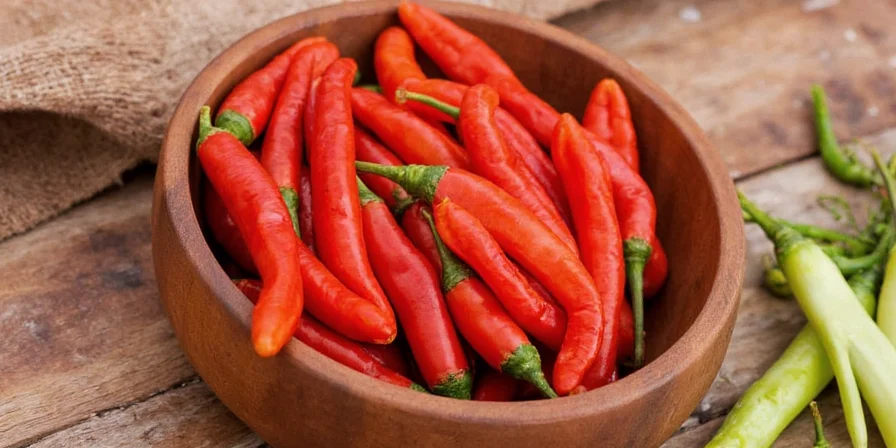Chiltepin: The Fiery Tiny Pepper That Packs a Punch
When it comes to spices, few can rival the unique flavor and heat of chiltepin peppers. These tiny, round chilies are not just any ordinary spice; they carry a rich history, a distinctive taste, and a myriad of uses in culinary traditions. In this blog post, we will explore the origins, characteristics, culinary uses, health benefits, and much more about chiltepin. So, buckle up and get ready to spice up your life!
What is Chiltepin?
Chiltepin, also known as Capsicum annuum var. glabriusculum, is a wild chili pepper native to the Americas, particularly Mexico and parts of the southwestern United States. Often referred to as the "mother of all peppers," chiltepin is believed to be one of the oldest cultivated chili peppers, dating back thousands of years.
Characteristics of Chiltepin
- Size: Chiltepin peppers are small, typically measuring only about 1/2 inch in diameter.
- Color: They start off green and ripen to a bright red or yellow, adding a splash of color to any dish.
- Heat Level: Chiltepin peppers are known for their intense heat, measuring between 50,000 to 100,000 Scoville Heat Units (SHU), making them significantly hotter than jalapeños.
- Flavor Profile: Beyond their heat, chiltepin peppers have a unique, smoky flavor that adds depth to dishes.
The History of Chiltepin
The history of chiltepin is as rich and varied as its flavor. Indigenous peoples of the Americas have been using chiltepin for thousands of years, both for culinary purposes and medicinal uses. Archaeological evidence suggests that chiltepin was domesticated in Mexico, where it became a staple in various regional cuisines.
Cultural Significance
In Mexican culture, chiltepin is more than just a spice—it's a symbol of culinary identity. The pepper is often associated with traditional dishes such as salsas and moles. In some regions, it is celebrated during festivals and local celebrations, highlighting its importance in the community.
Culinary Uses of Chiltepin
Chiltepin peppers are incredibly versatile and can be used in a variety of dishes. Below are some popular ways to incorporate chiltepin into your cooking:
1. Salsas and Sauces
Chiltepin is a key ingredient in many traditional Mexican salsas. The heat and unique flavor of chiltepin can elevate a simple tomato salsa to a new level. Try making Chiltepin Salsa:
- Ingredients:
- 10 ripe tomatoes
- 1-2 chiltepin peppers (adjust to taste)
- 1 onion, finely chopped
- 2 cloves of garlic, minced
- 1/4 cup fresh cilantro, chopped
- Salt to taste
- Instructions:
- Roast the tomatoes until the skin is blistered.
- Blend the roasted tomatoes, chiltepin peppers, onion, garlic, and cilantro until smooth.
- Add salt to taste and enjoy with tortilla chips or as a topping for tacos.
2. Soups and Stews
The smoky heat of chiltepin can enhance the flavors of hearty soups and stews. Add a pinch of crushed chiltepin to your next batch of chili or bean soup for an exciting twist.
3. Marinades and Rubs
Chiltepin can be ground into a powder and used in marinades or dry rubs for meats. Its intense flavor pairs well with chicken, beef, and fish. Here’s a simple Chiltepin Marinade recipe:
- Ingredients:
- 1/4 cup olive oil
- 2 tablespoons vinegar (apple cider or red wine)
- 1-2 teaspoons ground chiltepin
- 1 teaspoon garlic powder
- Salt and pepper to taste
- Instructions:
- Mix all ingredients in a bowl.
- Marinate your choice of meat for at least 1 hour before grilling or baking.
4. Infused Oils and Vinegars
Chiltepin can also be used to infuse oils and vinegars. Simply add whole chiltepin peppers to a bottle of olive oil or vinegar and let it sit for a couple of weeks to develop a spicy flavor.
Health Benefits of Chiltepin
In addition to its culinary uses, chiltepin peppers offer several health benefits:
- Rich in Vitamins: Chiltepin is an excellent source of vitamins A and C, which are essential for maintaining a healthy immune system.
- Metabolism Booster: The capsaicin in chiltepin can help boost metabolism, making it a great addition to weight loss diets.
- Anti-Inflammatory Properties: Capsaicin is known for its anti-inflammatory effects, which can help reduce pain and discomfort in the body.
How to Store Chiltepin
Storing chiltepin properly can help maintain its flavor and heat. Here are some tips:
- Drying: Dried chiltepin can be stored in an airtight container in a cool, dark place for several months.
- Freezing: Fresh chiltepin can be frozen to preserve its flavor. Simply wash and dry the peppers, then place them in a freezer bag.
Conclusion
Chiltepin is a remarkable pepper that deserves a place in every spice cabinet. Its unique flavor, heat, and health benefits make it a versatile ingredient that can elevate your cooking to new heights. Whether you’re a culinary novice or a seasoned chef, experimenting with chiltepin can add depth and excitement to your dishes. So, go ahead and embrace the fiery world of chiltepin!

| Chiltepin Characteristics | Details |
|---|---|
| Scientific Name | Capsicum annuum var. glabriusculum |
| Scoville Heat Units | 50,000 - 100,000 SHU |
| Flavor | Smoky, spicy |
| Common Uses | Salsas, soups, marinades |
Discover the fiery flavor of chiltepin and let your culinary creativity shine!










 浙公网安备
33010002000092号
浙公网安备
33010002000092号 浙B2-20120091-4
浙B2-20120091-4